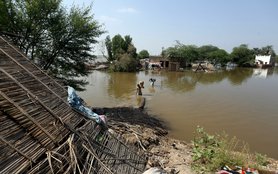Now is the time to incentivize a transition to sustainable energy sources and invest in resilient economies.
The COVID-19 pandemic has transformed into one of the worst economic crises in modern history. The effects have shown us how avoiding long-term investments in public health has left people vulnerable—some far more than others. Existing inequalities place the poorest communities at greater risk of infection and death while shouldering the brunt of the financial burdens .
All of this mirrors how we’ve approached climate change and its impact on our society. For decades, scientists and activists have called attention to this existential crisis by demanding that we invest now to prevent greater pain later. And governments, corporations, and multilateral institutions—even when working together—have failed to effectively address the issue.
As the world looks to rebuild from the severe health and economic shocks of COVID-19, the World Bank and its peers have a golden opportunity to respond to this crisis in new ways that can protect us from future threats. And incentivizing new approaches to boldly tackle climate change should be at the top of the list.
How COVID-19 teaches us to build back better
The World Bank’s board of directors—representing 189 countries—has committed large amounts of money to respond to the COVID-19 crisis: $14 billion in fast-track financing through early March, and up to an additional $160 billion over the next 15 months to support developing countries responding to the crisis. It’s another piece of proof that people of many ideologies can get behind fast and bold public investment and collective action in times of immediate crisis.
The good news is that the economic impacts of COVID-19 and climate change can be addressed at the same time—by building back better through resilient and sustainable development. Such an approach should not cause or increase risks and volatility for people living in poverty, but instead make progress towards a just world despite shocks, stress, and uncertainty.
The World Bank has put out some ideas, including a “sustainability checklist” for stimulus efforts and messaging on the opportunity to help the planet “reboot by making investments in fresher air, cleaner waters, less waste, more natural habitats and a stable climate” after COVID-19.
The European Bank for Reconstruction and Development also recently published a report arguing that the COVID-19 recovery can be an accelerator to “tilt to green” for a low-carbon economy, while the International Energy Agency has called on governments and international financial institutions to take advantage of this “historic opportunity” for sustainable recovery plans. UN Secretary-General António Guterres is calling for recovery spending to “drive a shift from the grey to green economy, and make societies and people more resilient.”
Believe in resilience? Fund resilience
These institutions must implement plans that match this rhetoric. While wealthy, industrialized nations can make these investments on their own, low- and middle-income countries will be looking to international financial institutions like the World Bank for support and guidance.
This puts the World Bank in a unique position—to be a leader in aligning economic stimulus packages with the urgent climate actions needed to limit warming to 1.5 degrees and build economies resilient in the face of climate change and other such shocks. These actions could include:
- fast-tracking a sustainable renewable energy transition towards universal electricity access and clean cooking;
- building sustainable infrastructure for critical supply chains needed for emergency response and essential services;
- investing in energy efficiency, transport, water and urban/rural development; and
- scaling up support for small women farmers as well as forest and watershed conservation.
Accelerating a sustainable recovery through bold climate action and investments would boost job creation through the opening of new markets and the strengthening of existing ones. Just as important is how this recovery should unfold: actions must be gender-responsive and embody feminist principles; ensure front-line communities—particularly women and indigenous groups—have a strong role in decision-making processes; and benefit the poorest and most vulnerable populations.
We cannot socially distance ourselves from the climate crisis
The World Bank was created at the Bretton Woods Conference more than 75 years ago to build back Europe after World War II. The development model we have today stems in part from this institution too often promoting the prioritization of economic growth above all else.
As the World Bank once again looks to build back, there is an opportunity to move past this model and on to one better suited for this century. The World Bank is sending the right signals regarding a sustainable recovery, but this is the time to go further on climate action by putting these plans into immediate action through their lending, capacity building, and technical advice interventions to governments.
Where there is political will, the world can get behind fast and bold collective actions in times of immediate crisis like COVID-19. Climate must be at the core of the rebuilding efforts, and the World Bank has a chance to help lead the way.


